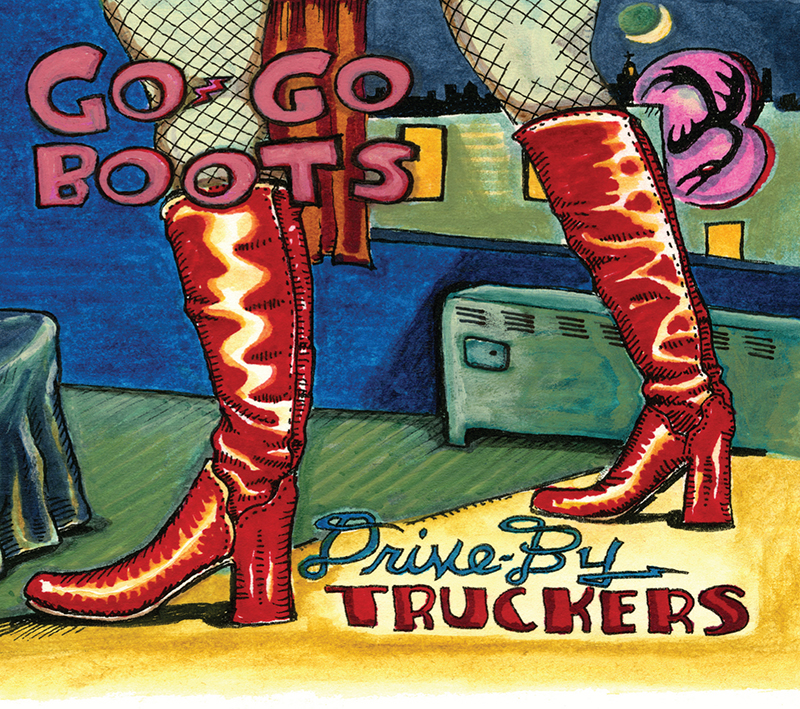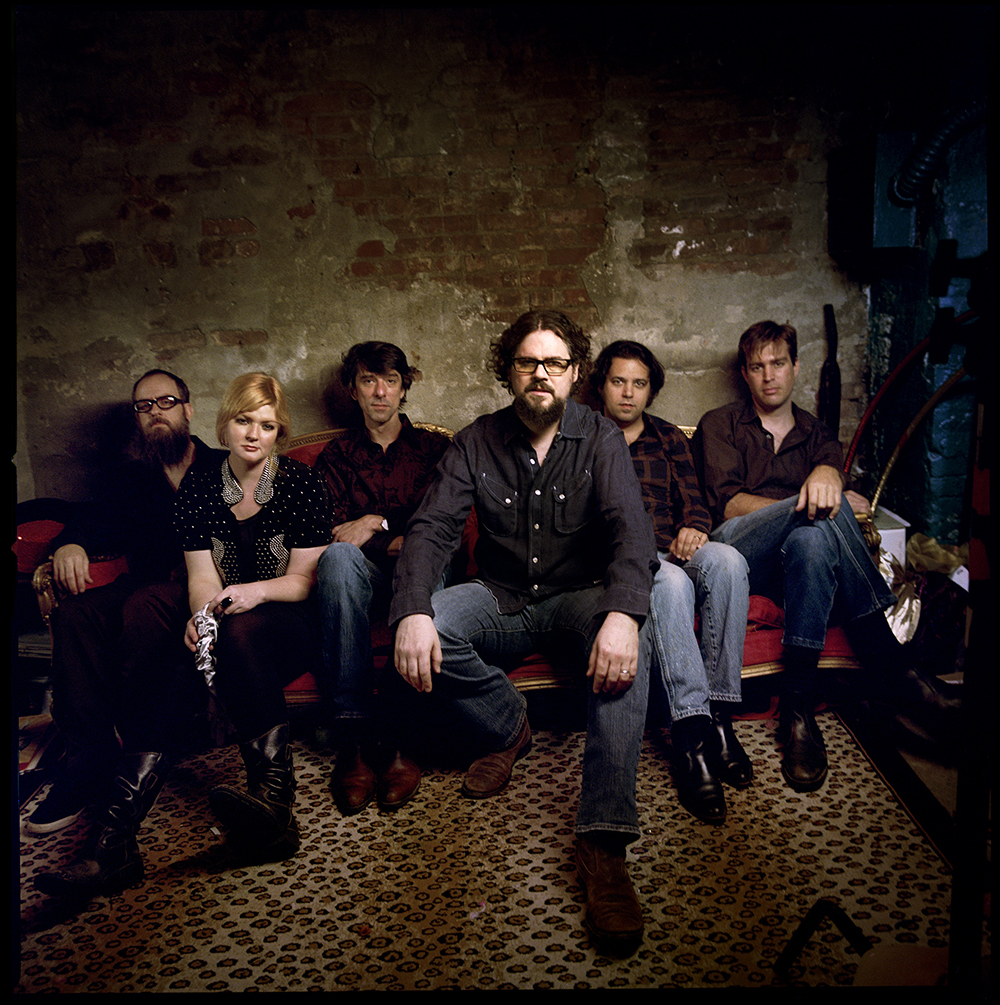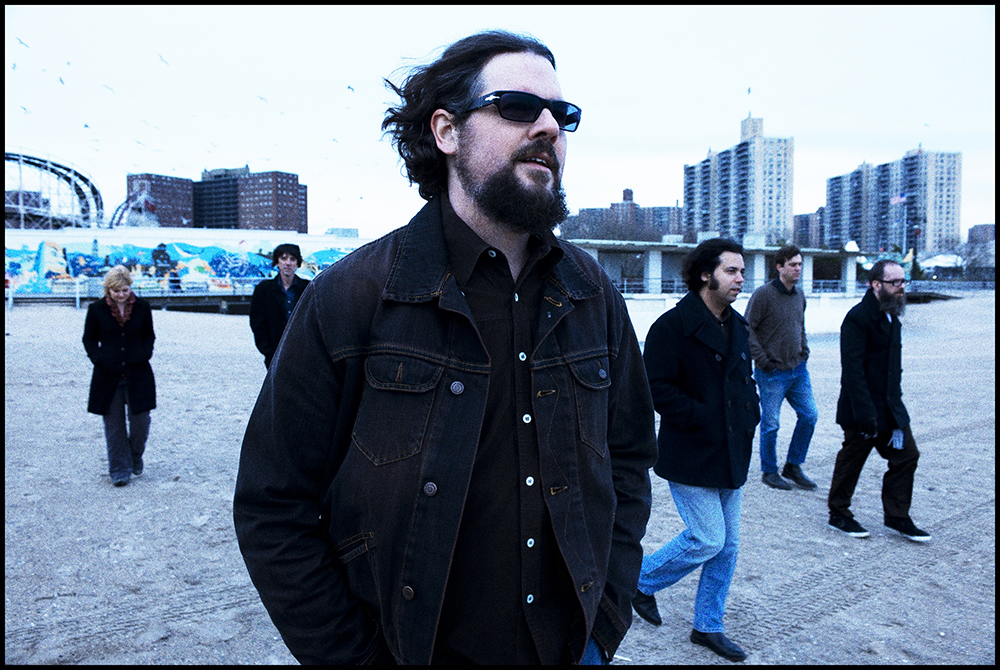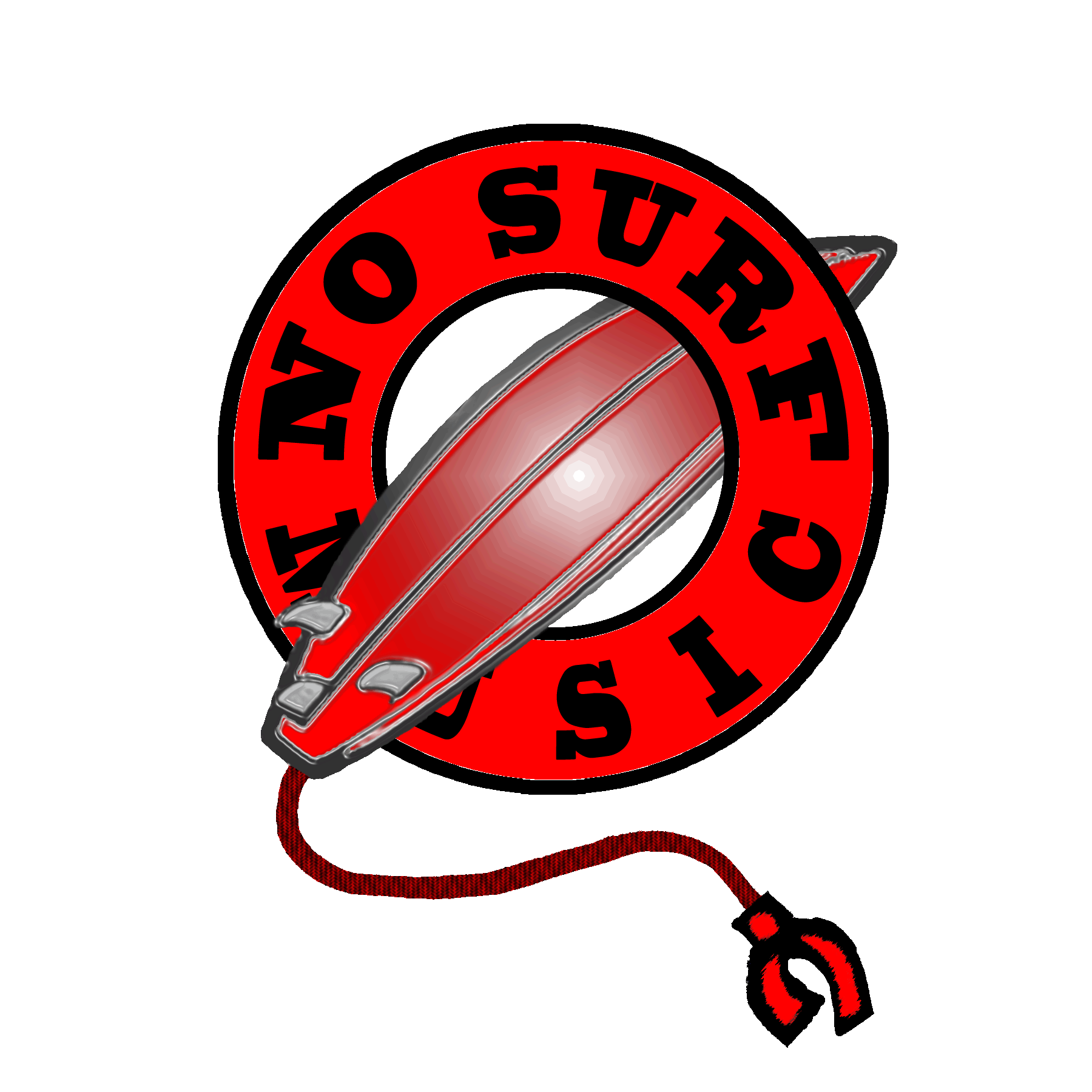
The Lowdown:
April 22, 2011
Drive-By Truckers: Go-Go Boots
by Jason D. 'Diesel' Hamad
Drive-By Truckers: blue-jean chic. That's a lot of band for one couch. (l to r) Brad Morgan, Shonna Tucker, Mike Cooley, Patterson Hood, Jay Gonzalez, John Neff. Photo by Danny Clinch.
On July 20, 2010 I had the unexpected privilege of watching the only two serious contenders for the undisputed heavyweight championship of alt country duel it out at the Beachland Ballroom. My buddy and I had planned to go see Drive-By Truckers open up for Tom Petty at Blossom, but when that show got cancelled due to the advanced age of the Heartbreakers and their inability to manage a real tour schedule, we turned the car around, headed up to Collinwood, and went to watch Old 97’s instead.
When we got there, we found out that the Truckers, not content to waste away for a night guzzling Jack in their hotel rooms, had called around town and found out that the Tavern was open for the night and they were planning to play a low-price, small venue show for the first time in a long time, right after Rhett and the boys left the stage. We went to the bar, plopped down $10 for tickets, and the extravaganza began.
The opening act, David Wax Museum, was awesome (you’ll hear more about them on this site soon, I’m sure), but when they left the stage, the main event was on. Old 97’s were at the top of their game. I’ve seen them a number of times, and in my experience, this was the best they ever played. I think they knew they had a pretty tough act following them in the next room.
When the 97’s finished up, they opened the doors to the bar next door and the 100 people lucky enough to have acquired tickets poured into the room. A line stretched down the block, people who heard too late but still hoped for the chance that someone would die of a heart attack before their ticket was torn.
That night, the Truckers indisputably took the belt. Going on at 11:30, they played an amazing, frantic, whiskey soaked album-cut-and-cover-only set that lasted more than three hours. They took songs that I’d barely noticed before and made them shine. The only complaint was that the damn sound guy had the volume so high it was literally easier to hear the lyrics across the street, but it was proof positive that whenever they want to, Drive-By Truckers can take on all comers and kick their asses without even breaking a sweat.
Unfortunately, their newest studio effort shows none of that live-show energy, nor any of their past studio brilliance. The Valentine’s-Day-released Go-Go Boots, coming hard on the heels of 2010’s The Big To-Do (Get it… heels? Boots? I crack me up) seems like an afterthought. And it’s a good rule of thumb that afterthoughts are best stuck in a drawer and left unpublished. In fact, the two albums could have (and probably should have) been combined to create one pretty good product instead of two fairly lackluster ones, with the remnants stuck on a rarities collection somewhere down the road for the real diehards.
DBT’s offerings have always been inconsistent, filled with absolutely transcendent highlights and a bunch of album tracks that just sort of lay there and don’t move around too much. Over the years I’ve learned to accept this. Listening to a bunch of unexciting misses is a fair price to pay for the brilliance of a “Gravity’s Gone,” a “Putting People on the Moon,” a “Carl Perkins’ Cadillac” or a “Steve McQueen.” Even an “18 Wheels of Love.” But none of the songs on either of the newest albums reaches anywhere near these heights, and even the album cuts are poorer quality than usual.
Go-Go Boots does feature a number of good songs. The best is “Everybody Needs Love.” Like a good ol’ Motown R&B tune with a country twist, the song by front man Patterson Hood is upbeat without becoming sappy or too clichéd. “And nobody ever found happiness living their lives all alone,” Patterson reminds us.
Based on publicity photos, it's virtually impossible to guess which of these people might be the Truckers' frontman. Photo by Danny Clinch.
I used to walk around like I didn't need nobody to be happy and at home
And one sad day I found myself in trouble, way down without a friend.
Along came the love of a real good woman, said she'd love me 'til the end.
Everybody needs love, love, love.
This last bit forms a refrain that is repeated throughout the song so much that it should get annoying, but it never does.
Another pretty good one is the leadoff track, “I Do Believe.” Beginning with a chant of “I do believe, I do believe” with just drums in the background, the song soon breaks into a somewhat innocuous but relatively entertaining rock tune. This song is another in a long line of Patterson Hood compositions that reflect childhood-era memories. Who exactly he’s talking about is unclear, but he intonates:
I know that you would never leave me
And when you slipped the earthly binds you still live in my mind.
And when I'm gone, again I'll find
My way back into your kitchen
And see you standing there in the window's shine.
I do believe I do believe.
The Truckers seem to like songs about preachers committing ungodly acts, especially when they involve sex and/or murder, and the two other highlights on the album both fit with this meme. In fact, the two are highly related, telling almost identical stories with different outcomes in the end. In both, a southern preacher with a single son has a woman on the side, and he hires some men to murder his wife. The first, the title track, is a blues rock tune with a murder scene reminiscent of the baptism scene in “The Godfather.” As Hood tells the story:
Missy wore them go-go boots; it did something for him.
Made him think his wife back home was homely and borin'.
He met these guys who didn't mind gettin' dirty.
He was a pillar and his alibi was sturdy.
It only took a little bit of cash and the deed was done.
In this version, the preacher gets away with the crime, but not so in the retelling, “The Fireplace Poker.” Here, the amateur assassins botch the job, leaving the preacher to finish his wife off with the handiest tool available. This time, the hit men brag, the girl talks and the police close in. The preacher hopes the pair of criminals will take the rap because:
Life is cheap for a couple of creeps but this here is the smoker.
Their prints were found all around the room, but not on the fireplace poker.
The Preacher's son brought his father home and followed him inside.
Shots rang out in the Tuscumbia night.
Was he alone when he died?
There are a number of other tracks that are decent, notably a pair by band co-founder Mike Cooley. The first, “The Weakest Man,” is a fairly typical “bye, bitch” song but features some interesting lyrics, including:
Leaving you won’t be any harder than walkin’ out the door and leaving town.
But I'll be leaving knowing surviving you don't make me stronger
Than the weakest man who's ever turned you down.
The second, “Pulaski,” is also pretty fair for an album cut. It tells the story of a girl who goes to California after college, only to find that L.A. is the place where dreams go to die, not to mention sometimes wide-eyed girls from Pulaski, Tennessee. Several of Hood’s remaining tracks are also respectable, particularly “Used to be a Cop,” which features driving bass mixed with jittery rhythm guitar and haunting lead. The dark, smoky, hyper, dissonant music perfectly matches the psyche of the burnt out ex-cop it portrays.
“The Thanksgiving Filter” is a passable story about the “joys” of getting together with the family over the holidays and the need to use heavy drinking as a shield, but it is by no means one of Patterson’s best compositions. The worst moment comes when he rhymes “present,” “presents” and “presence” on consecutive lines. “Ray’s Automatic Weapon” is a ponderous, strange little song about a Vietnam vet who borrowed his friend’s gun and doesn’t trust himself to keep it as he slowly begins to lose his grip.
The last track on the album, “Mercy Buckets,” is quite unlistenable. It is an attempt to reprise the friendship themes of the first track, but lacks any sort of organized musicality. Still, the absolute lowlights of the album are the two songs sung by long-time bassist Shonna Tucker. While I would in theory relish the addition of a feminine voice in this male-dominated band, I would prefer it not be such an uneven one. “Where’s Eddie” is an unexciting, sometimes painful song. Tucker tries so hard, yet fails so miserably. Even worse is “Dancin’ Ricky,” which is a downright horrible song, quite possibly the worst I’ve ever heard from a band that I respect. While she does an admirable job of laying down bass tracks for the boys, when Tucker sings she destroys everything she touches. Sometimes it’s true that women should be seen and not heard.
While there are a few noteworthy tracks on this album, overall it’s a bust. If you love DBT and think that the green puss dripping from Patterson Hood’s dick is as good as gold, then this album is for you. If you’re a saner fan, save your money and just play The Dirty South backwards. It’ll sound just as good.
| mp3 | cd | vinyl |
|---|---|---|








